高二英语省略句知识精讲
高中英语知识点归纳省略句的分类与用法

高中英语知识点归纳省略句的分类与用法高中英语知识点归纳——省略句的分类与用法一、省略句概述省略句,指在句子中省略掉其他成分,只保留部分成分或不保留任何成分的句子,是英语中常见的一种句子结构。
省略句的使用可以简化句子结构,提高语言的表达效果,但在实际应用中需要注意使用的准确性和合理性。
省略句的分类与用法主要包括以下几个方面:二、主语、宾语和谓语的省略1. 主语的省略在一般现在时和一般过去时的陈述句、祈使句和感叹句中,当主语是代词时,常常可以省略主语。
例如:(1) Got it.(2) Good idea!2. 宾语的省略在一些交际性较强的场合,特别是口语中,常常可以省略动词的宾语。
例如:(1) Can you lend me a pen? → Can you lend me?(2) I saw the movie last night. → I saw last night.3. 谓语的省略在上下文已经明确的情况下,可以省略谓语动词。
例如:(1) Have you finished your homework? → Yes, I have.(2) I didn't see you at the party. → No, I didn't.三、定语和状语的省略1. 定语的省略当被修饰语已经被前面提及或上下文中明确时,可以省略定语从句中的关系代词或连词。
例如:(1) The book that I borrowed from the library is very interesting. → The book I borrowed from the library is very interesting.(2) The girl who is wearing a r ed dress is my sister. → The girl wearinga red dress is my sister.2. 状语的省略在某些情况下,可以省略状语从句或状语从句中的一些成分。
高中英语知识点归纳省略句的种类与用法
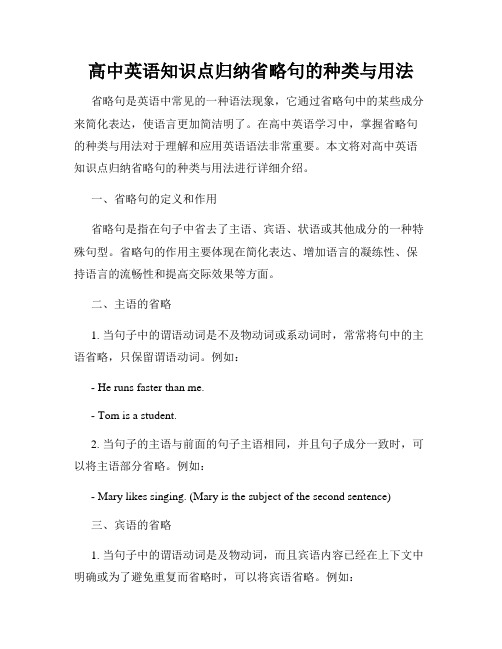
高中英语知识点归纳省略句的种类与用法省略句是英语中常见的一种语法现象,它通过省略句中的某些成分来简化表达,使语言更加简洁明了。
在高中英语学习中,掌握省略句的种类与用法对于理解和应用英语语法非常重要。
本文将对高中英语知识点归纳省略句的种类与用法进行详细介绍。
一、省略句的定义和作用省略句是指在句子中省去了主语、宾语、状语或其他成分的一种特殊句型。
省略句的作用主要体现在简化表达、增加语言的凝练性、保持语言的流畅性和提高交际效果等方面。
二、主语的省略1. 当句子中的谓语动词是不及物动词或系动词时,常常将句中的主语省略,只保留谓语动词。
例如:- He runs faster than me.- Tom is a student.2. 当句子的主语与前面的句子主语相同,并且句子成分一致时,可以将主语部分省略。
例如:- Mary likes singing. (Mary is the subject of the second sentence)三、宾语的省略1. 当句子中的谓语动词是及物动词,而且宾语内容已经在上下文中明确或为了避免重复而省略时,可以将宾语省略。
例如:- Can you speak French? Yes, I can. (French is the object of speak)四、状语的省略1. 当句子中的状语从句与主句的主语或宾语一致时,可以将状语从句中的主语或宾语省略。
例如:- He speaks English better than I (do). (I is the subject of do)- She likes swimming more than her sister (does). (Her sister is the subject of does)2. 当句子中的状语从句与主句的谓语动词一致时,可以将状语从句中的谓语动词省略。
例如:- I work harder than you (do). (Do is the verb of the subordinate clause)五、被动语态的省略1. 当句子中的被动语态中的被动助动词和be动词前面有介词时,可以将be动词和介词省略。
高考英语省略句解析

高考英语省略句解析省略是英语语法中的一个重要现象,尤其在高考英语中经常会出现省略句。
省略句的出现不仅能够简化句子结构,使语言更加简练流畅,还有助于提高语言的表达效果。
本文将详细解析高考英语中常见的省略句,帮助考生更好地理解和应对这一题型。
1. 省略主语省略主语是英语中最常见的省略形式之一。
当主语在上文中已经明确指代或暗示时,可以在下文中省略主语,使句子结构简洁明了。
例如:原句:Tom is good at playing basketball. He often wins the game.省略主语:Tom is good at playing basketball. Often wins the game.2. 省略谓语谓语的省略在高考英语中也较为常见。
当句子的主语为it, this, that, these, those等指示代词时,常常可以省略谓语动词,简化句子结构。
例如:原句:He knows a lot about computers, but I don't know.省略谓语:He knows a lot about computers, but I don't.3. 省略宾语宾语的省略是一种语言表达的简化方式。
当句子中的宾语是人称代词时,常常可以省略宾语,使句子更加简洁。
例如:原句:I saw him yesterday, but he didn't see me.省略宾语:I saw him yesterday, but he didn't see.4. 省略定语从句定语从句的省略在高考英语中也颇为常见。
当定语从句的主语和谓语与主句中的一致时,可以将定语从句中的主语和谓语省略,只保留从句中的关系词和其他修饰成分。
例如:原句:The book that I borrowed from the library yesterday is very interesting.省略定语从句:The book I borrowed from the library yesterday is very interesting.5. 省略介词短语在高考英语中,介词短语的省略也是一种常见现象。
高考英语省略句专项讲解
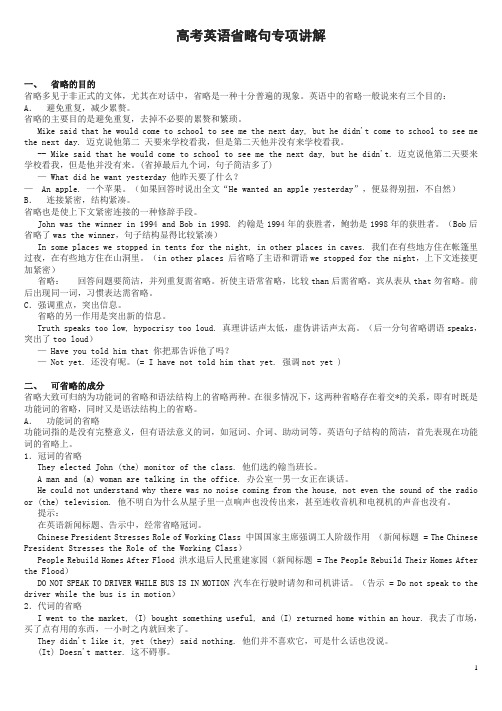
高考英语省略句专项讲解一、省略的目的省略多见于非正式的文体,尤其在对话中,省略是一种十分普遍的现象。
英语中的省略一般说来有三个目的:A.避免重复,减少累赘。
省略的主要目的是避免重复,去掉不必要的累赘和繁琐。
Mike said that he would come to school to see me the next day, but he didn't come to school to see me the next day. 迈克说他第二天要来学校看我,但是第二天他并没有来学校看我。
-- Mike said that he would come to school to see me the next day, but he didn't. 迈克说他第二天要来学校看我,但是他并没有来。
(省掉最后九个词,句子简洁多了)— What did he want yesterday 他昨天要了什么?—An apple. 一个苹果。
(如果回答时说出全文“He wanted an apple yesterday”,便显得别扭,不自然)B.连接紧密,结构紧凑。
省略也是使上下文紧密连接的一种修辞手段。
John was the winner in 1994 and Bob in 1998. 约翰是1994年的获胜者,鲍勃是1998年的获胜者。
(Bob后省略了was the winner,句子结构显得比较紧凑)In some places we stopped in tents for the night, in other places in caves. 我们在有些地方住在帐篷里过夜,在有些地方住在山洞里。
(in other places 后省略了主语和谓语we stopped for the night,上下文连接更加紧密)省略:回答问题要简洁,并列重复需省略。
祈使主语常省略,比较than后需省略。
高考英语省略知识点
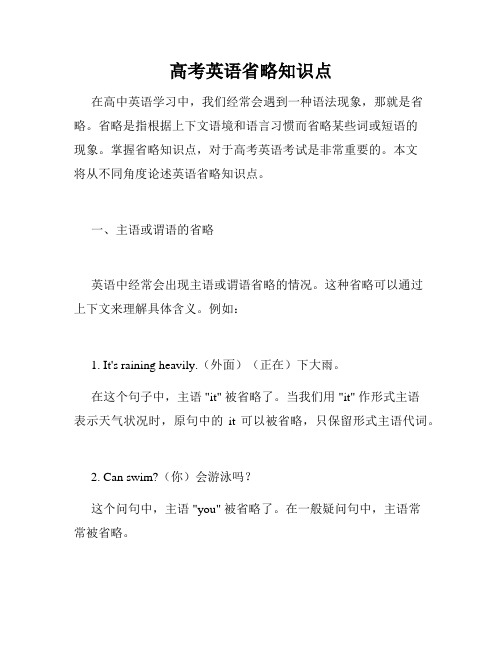
高考英语省略知识点在高中英语学习中,我们经常会遇到一种语法现象,那就是省略。
省略是指根据上下文语境和语言习惯而省略某些词或短语的现象。
掌握省略知识点,对于高考英语考试是非常重要的。
本文将从不同角度论述英语省略知识点。
一、主语或谓语的省略英语中经常会出现主语或谓语省略的情况。
这种省略可以通过上下文来理解具体含义。
例如:1. It's raining heavily.(外面)(正在)下大雨。
在这个句子中,主语 "it" 被省略了。
当我们用 "it" 作形式主语表示天气状况时,原句中的it 可以被省略,只保留形式主语代词。
2. Can swim?(你)会游泳吗?这个问句中,主语 "you" 被省略了。
在一般疑问句中,主语常常被省略。
3. Coming!(我正在)来了!这个句子中,谓语 "am" 被省略了。
在表示将来的动作时,主语 "I" 的 "am" 可以省略。
二、宾语的省略在某些情况下,宾语可以被省略掉。
这种省略通常出现在某些固定句型中,常要根据上下文来理解。
例如:1. Can you pass (me) the salt?这个句子中,宾语 "me" 被省略了。
在交际用语中,表示请求或指示对方给予自己某物时,宾语往往被省略。
2. Let's go (to) the park.这个句子中,宾语 "to" 被省略了。
在 go, come, return, fly, drive 等表示“去”或“来”的动词后,表示地点的宾语常被省略。
三、连词的省略有时候,连词也可以被省略。
这种省略常见于并列连词和条件连词。
例如:1. You can have either apples (or) oranges.这个句子中,连词 "or" 被省略了。
高中英语语法精讲——省略句
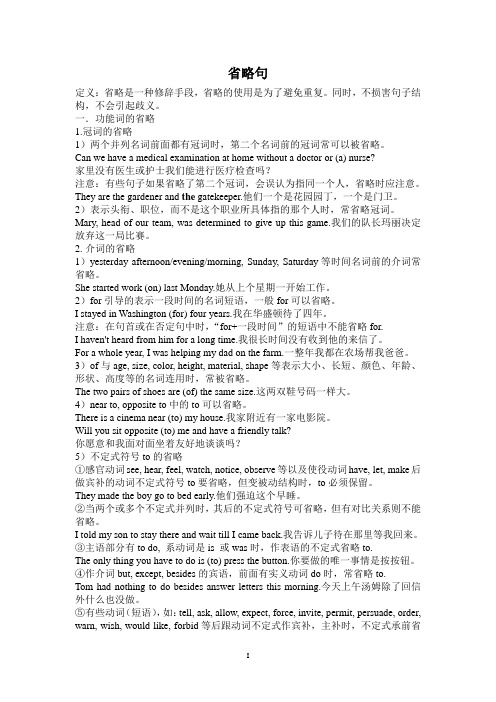
省略句定义:省略是一种修辞手段,省略的使用是为了避免重复。
同时,不损害句子结构,不会引起歧义。
一.功能词的省略1.冠词的省略1)两个并列名词前面都有冠词时,第二个名词前的冠词常可以被省略。
Can we have a medical examination at home without a doctor or (a) nurse?家里没有医生或护士我们能进行医疗检查吗?注意:有些句子如果省略了第二个冠词,会误认为指同一个人,省略时应注意。
They are the gardener and the gatekeeper.他们一个是花园园丁,一个是门卫。
2)表示头衔、职位,而不是这个职业所具体指的那个人时,常省略冠词。
Mary, head of our team, was determined to give up this game.我们的队长玛丽决定放弃这一局比赛。
2.介词的省略1)yesterday afternoon/evening/morning, Sunday, Saturday等时间名词前的介词常省略。
She started work (on) last Monday.她从上个星期一开始工作。
2)for引导的表示一段时间的名词短语,一般for可以省略。
I stayed in Washington (for) four years.我在华盛顿待了四年。
注意:在句首或在否定句中时,“for+一段时间”的短语中不能省略for.I haven't heard from him for a long time.我很长时间没有收到他的来信了。
For a whole year, I was helping my dad on the farm.一整年我都在农场帮我爸爸。
3)of与age, size, color, height, material, shape等表示大小、长短、颜色、年龄、形状、高度等的名词连用时,常被省略。
高考英语中省略常见考点讲解
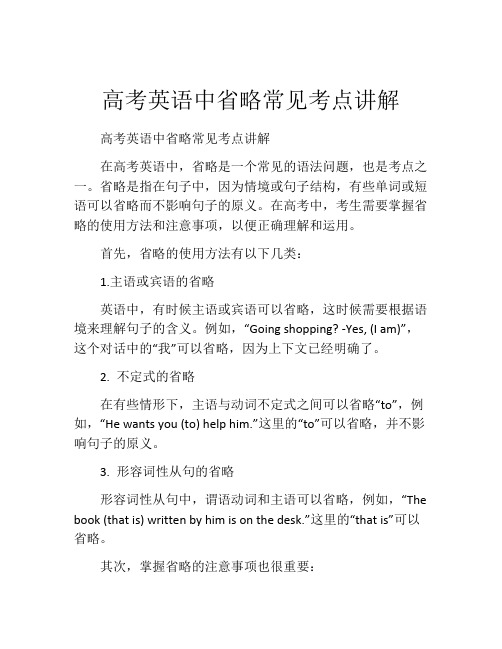
高考英语中省略常见考点讲解高考英语中省略常见考点讲解在高考英语中,省略是一个常见的语法问题,也是考点之一。
省略是指在句子中,因为情境或句子结构,有些单词或短语可以省略而不影响句子的原义。
在高考中,考生需要掌握省略的使用方法和注意事项,以便正确理解和运用。
首先,省略的使用方法有以下几类:1.主语或宾语的省略英语中,有时候主语或宾语可以省略,这时候需要根据语境来理解句子的含义。
例如,“Going shopping? -Yes, (I am)”,这个对话中的“我”可以省略,因为上下文已经明确了。
2. 不定式的省略在有些情形下,主语与动词不定式之间可以省略“to”,例如,“He wants you (to) help him.”这里的“to”可以省略,并不影响句子的原义。
3. 形容词性从句的省略形容词性从句中,谓语动词和主语可以省略,例如,“The book (that is) written by him is on the desk.”这里的“that is”可以省略。
其次,掌握省略的注意事项也很重要:1.根据上下文理解在高考英语中,出现省略的句子往往需要依靠上下文来理解,考生需要仔细阅读上下文,避免对省略造成误解。
2. 不定式的省略最常用在省略中,不定式的省略是最常见的,考生需要掌握不定式的使用方法,才能正确理解和运用省略。
3. 注意省略对句子成分的影响在句子中出现的省略,会影响到句子的成分和语法结构,考生需要仔细分析和理解涉及到的语法问题。
综上所述,省略是高考英语中的一个常见考点,考生需要掌握省略的使用方法和注意事项,以便正确理解和运用。
在备考中,可以通过大量练习和查阅相关资料来提高自己的掌握程度,避免省略造成的误解和错误。
【高中英语】高中英语省略和倒装语法知识点

【高中英语】高中英语省略和倒装语法知识点1.简单句中的省略1.语境中省略(1)陈述句中在驳斥的助动词前,并作主语的人称代词可以省略。
例如:couldn’tunderstandwhathewanted.我稀奇古怪他想什么。
(2)但在肯定陈述句中,have,be,will前作主语的人称代词不可以省略。
如: iwillseeyousoon.我很快去看你。
其他情况则不受限制。
例如:hopetohearfromyousoon.期望很快接到你的信。
(3)疑问句中省略主语的人称代词和助动词。
如:(haveyou)hadagoodtime?你玩得高兴吗?(4)句首的therebe和itis的省略。
例如:(there’s)nobodyathome.家里没有人。
(isthere)anythingthematter?存有紧要事吗?(5)动词的省略。
如:恳请跑这边。
2.重复的省略动词不定式的省略,只留存不定式符号。
例如:iwenttherebecauseiwantedto.我回去那儿是因为我想要回去。
说明:①动词不定式的省略通常发生在动词like,love,hope,need,try,wish,want等动词之后。
例如:didyouseethepyramids?你看看金字塔了吗?no,iwantedto(seethem)buttherewasn'ttime.没有回去。
我想要回去看看,但没有时间。
②在助动词haveto,oughtto,usedto,beableto和begoingto之后的动词不定式可以省略。
如:doyoudoyourownhousework?你做家务吗?iusedto,butnowi'vegotaserviceflat.过去常常做,但是现在我有公寓服务了。
③有时形容词或名词后的整个动词不定式(和动词原形)一起省略。
如:我说实话,但我没时间去。
④w ant和wouldlike后的不定式省略后常要保留to,但在从句中却常常省略。
- 1、下载文档前请自行甄别文档内容的完整性,平台不提供额外的编辑、内容补充、找答案等附加服务。
- 2、"仅部分预览"的文档,不可在线预览部分如存在完整性等问题,可反馈申请退款(可完整预览的文档不适用该条件!)。
- 3、如文档侵犯您的权益,请联系客服反馈,我们会尽快为您处理(人工客服工作时间:9:00-18:30)。
4. 动词不定式的省略:在动词不定式结构中,为了避免重复,常常省略不定式结构中的 动词原形,只保留 to。
( 1)— Would you like to go with us ?
— I’m glad to, but I have to finish my homework. ( 2)Don’t tell me the name of the sailor if you don ’t want to.
B. in the way that
C. in the way
D. the way which
分析: way 表示:“方式”后面的定语从句由 that / in which 引导或者省略关系代词,本
句的定语从句 he said it 省略了关系代词。
答案: A
4. — Susan, will you please go and empty that drawer?
B. having questioned
C. questioned
D. to be questioned
分析:本句 when 后面省略了 I was
答案: C
3. What surprised me was not what he said but _____ he said it.
A. the way
— ______?
A. What for
B. What is it
C. How is it
D. How come
分析: 第二个人不知道为什么要倒空抽屉,所以问为什么。 整表达应是 What are you going to use the empty drawer for ?
答案: A
What for (为什么)它的完
【 题型展示 】
1. When first _____ to the market, these products enjoyed great success.
A. introducing
B. introduced
C. introduce
D. being introduced
分析: when 引导的时间状语从句,如果从句的主语和主句的主语相同,且从句中谓语
B. If it possible
C. If possible D. Possible
2. — Do you follow me? —Yes, _____.
A. it is good
B. I will
C. perfectly
D. very good
3. — How are you getting on with your work ? — Oh, I’m sorry. Things aren ’t going so well as _____.
11. — _____ did you come to know the actor ?
— He’s a close friend of my sister ’s.
A. How
B. Why
C. Where
D. When
分析:根据答语 He’s a close friend of my sister ’s :他是我姐姐的一个好朋友。
【 本讲主要内容 】
省略句
高二英语省略句
【 知识总结归纳 】
1. 简单句中的省略: 在对话中, 交谈双方都知道谈论的对象, 则可以省略句子的主语, 省略主语和谓语的现
象在交际用语中出现的很多。
( 1)Looks like rain.
( 2)Hope to hear from you soon.
( 3)Sounds like a good idea.
答案: A
8. — Is your mother going to the supermarket ?
— No, ______.
A. she doesn’t
B. she’s cooking
C. she gets by bus
D. to a tailor ’s shop
分析: 根据对话的语境,表明:我妈妈不打算去超市,而是去裁缝铺。
是 She is going to a tailor ’s shop.的省略。
to a tailor ’s shop
答案: D
9. — She may not be free today. — _____, we’ll have to put the meeting off.
A. If may
B. If not
5. I ’m looking forward as much to her return as she herself to _____ me.
A. have seen
B. seeing
C. meet
D. be met
分析:本句后半部分 as she herself to _____ me 是 as she herself is looking forward to seeing
分析: 上文说:我想挪一下这张桌子。所以第二个人问:你想把它放在哪里?
答案: C
13. — _____did you sleep last night ?
— I sat up reading too late to fall asleep.
A. How long
B. How soon
C. How
D. When
me 的省略。 答案: B
6. Who can you turn to in time of danger, if not ______?
A. ourselves
B. ours
C. we
D. us
分析: if not ______ 是 if you don ’t turn to us 的省略。
答案: D
( 3)We’ll go to help you if necessary.
( 4)Had I time, I would come.
( 5)I ’ll go, should it be necessary.
( 6)The captain can find a boat quicker than we can.
( 2)My father planned and built all these houses.
( 3)John won the first race and Jimmy the second.
( 4)Coral is not a plant but a variety of animal life.
7. — Did you visit the museum last week ?
— No, we _____, but we spent too much time shopping.
A. could have
B. could
C. must have
D. must
分析: 句中 we _____是 we could have visited the museum last week. 的省略形式。
部分有 be 时,可以省略句中的主语和 be,本句中 when 后面省略了 these products were.
答案: B
2. It shames me to say it, but I told a lie when _____ at the meeting by my boss.
A. questioning
宾语从句: 如果宾语从句中的谓语部分与主句的谓语部分或上文的谓语部分相同, 从句部分的谓语省略。
可将
( 1)We will do what we can ( do) to help you.
( 2)— Is Mr. King in his office?
— Sorry, I don ’t know ( whether he is in his office or not ) .
3. 复合句中的省略: 定语从句:
( 1)That ’s the reason he is late for the conference.
( 2)I don ’t like the way he talks.
状语从句:
( 1)If heated, water will boil.
( 2)Tom was attacked by cramp while swimming across the river.
对方在问:你是怎么认识那位男演员的。
答案: A
可以知道:
12. — Can you give me a hand with this table? I want to move it. — Sure. _____ are you going to put it?
A. Why
B. How
C. Where D. When
后面的动词原形。
( 1)They do not visit their parents as much as they ought to.
( 2)He doesn’t get up early as he used to.
( 3)I ’ll hand it in if I have to.
( 4)— Would you like to come tonight ?
A. plans
B. planning
C. planned
( 9)Sorry to hear that.
( 10)Doesn’t matter.
( 11) Terrible weather!
( 12)Pity you couldn ’t come.
2. 并列句中的省略: 在并列句中,相同的成分如主语,谓语,宾语等都可以省略:
